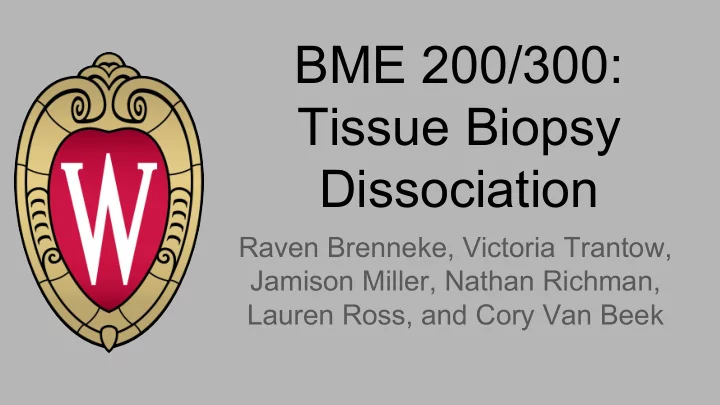

BME 200/300: Tissue Biopsy Dissociation Raven Brenneke, Victoria Trantow, Jamison Miller, Nathan Richman, Lauren Ross, and Cory Van Beek
Overview ● Problem Statement ● Client Overview ● Background ● Summary PDS ● Designs and Design Matrix ● Future Work ● Acknowledgments
Problem Statement and Client Overview Dr. Sameer Mathur conducts asthma research and frequently obtains small lung tissue biopsies from patients Current device being used for tissue dissociation are designed for larger scale specimens of tissue Small biopsies are not compatible with this device-cells do not dissociate The team’s task: develop a smaller scale device to successfully dissociate a smaller tissue specimen
Asthma & Lung Biopsies What is asthma caused by? ● Airborne allergens ● Inflammatory response led by T-helper type lymphocytes [1] How are lung biopsies performed? ● Needle, thoracoscopic, transbronchial, open [2] ● Client does bronchoscopies ● fiberoptic bronchoscope through airways ● 1-2 mm tissue
Tissue Dissociation Why dissociate? ● Compare tissues before and after asthmatic reaction ● Flow cytometry [3] ● Eosinophils and lymphocytes How? ● Mechanical and chemical methods ○ Shouldn’t lyse cells ● Enzyme: Collagenase G ○ Need to disturb ECM
Summary PDS Performance requirement: ● 50% cell recovery with a margin of error of +/- 10% ● Design must produce viable cells through many rounds of testing. Target cost: $5-$10 per use Miltenyi GentleMACS Device
Design 1 [4]
Design 2
Design 3
Design Matrix Modification of Microfluidic Mechanical Design Idea: current design Performance 24 (3/5) 32 (4/5) 24 (3/5) (40) Ease of 10 (2/5) 20 (4/5) 15 (3/5) fabrication (25) Cost/usage 12 (3/5) 20 (5/5) 12 (3/5) (20) Ease of use 15 (5/5) 9 (3/5) 12 (4/5) (15) Total 61 80 63 (100)
Future Work ● Solidworks ○ Calculations from cell physiology ■ Shear Forces ■ Channel Size ● Fabrication ○ 3D Printing ○ Laser Cutting ○ Micromilling ● Testing ○ Procedures ○ Channel Designs ○ Enzymes ● Analyzing data ○ Optimize procedure based on results
Acknowledgements Dr. Sameer Mathur Professor Wan Ju Li
Questions?
References [1] J. R. Murdoch and C. M. Lloyd, “Chronic inflammation and asthma,” Mutation Research , 07-Aug-2010. [Online]. Available: https://www.ncbi.nlm.nih.gov/pmc/articles/PMC2923754/. [Accessed: 05-Oct-2017]. [2] “Lung Biopsy,” Lung Biopsy | Johns Hopkins Medicine Health Library . [Online]. Available: http://www.hopkinsmedicine.org/healthlibrary/test_procedures/pulmonary/lung_biopsy_92,P07750. [Accessed: 05-Oct-2017]. [3] “Introduction to flow cytometry,” Flow cytometry introduction | Abcam , 06-Oct-2017. [Online]. Available: http://www.abcam.com/protocols/introduction-to-flow-cytometry. [Accessed: 05-Oct-2017]. [4] Dr. R-P. Peters, Dr. E. Kabaha, W. Stoters, G. Winkelmayer and F. Bucher, “Device for fragmenting tissue,” European Patent Specification #EP2540394B1, May 05th, 2016
Recommend
More recommend